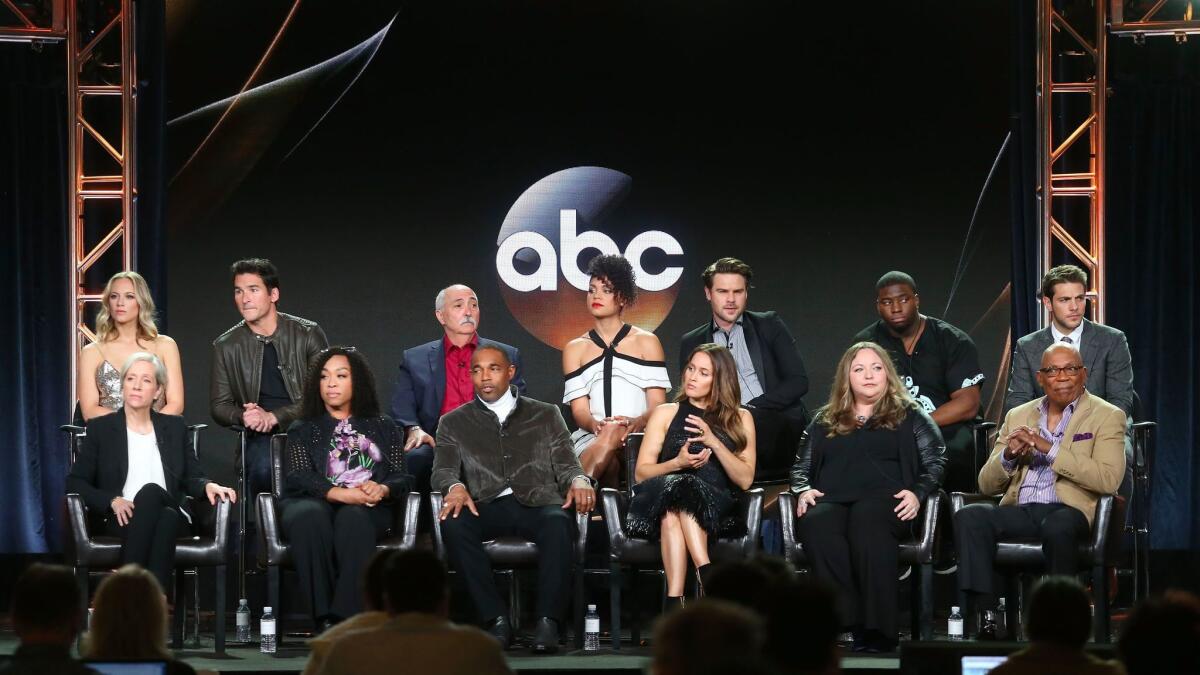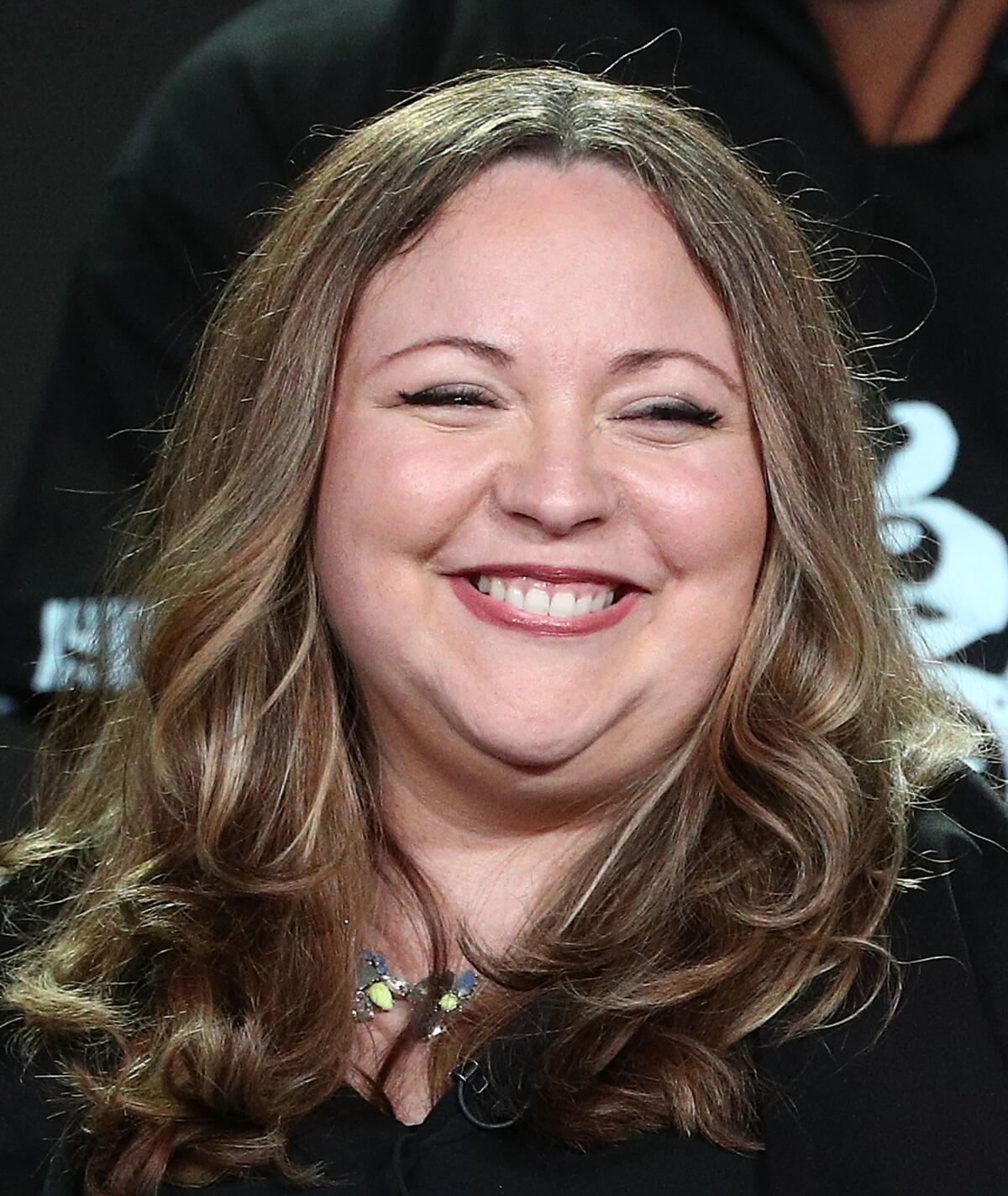Q&A: The showrunner for the ‘Grey’s Anatomy’ spinoff isn’t worried that the show still doesn’t have a title

- Share via
Despite not having a title, the upcoming “Grey’s Anatomy” spinoff is already slated for an outsized premiere.
The show, which stars Jason George and Jaina Lee Ortiz, will be inducted into the Shonda Rhimes-branded Thursday programming block, “TGIT” (Thank God It’s Thursday), with a special two-hour premiere March 22 at 9 p.m. It shifts to its regular time slot, Thursdays from 9-10 p.m., on March 29 — pushing “Scandal” to finish out the last episodes of its final season at the 10 p.m. hour.
The spinoff is the second offshoot of “Grey’s Anatomy.” The first, “Private Practice,” starred Kate Walsh and ran for six seasons before coming to a close in 2013. This new, untitled spinoff is set in Seattle, as “Grey’s” is, and revolves around firefighters.
The Times spoke to Stacy McKee, the spinoff’s showrunner and longtime “Grey’s Anatomy” writer, about the new series, the hubbub over its lack of a name and potentials for crossovers.
Has it surprised you how much has been made of the show not having a title, and how close are you to landing on one?
I am surprised by the fascination, but I'm also kind of delighted because I think it means people are interested in the show. I’m not stressed about it.
I have a bulletin board in my office with dozens and dozens and dozens of Post-it notes with names on them. I know that the right title will be there and we're not going to air it without the title.
You’ve been a writer on “Grey’s Anatomy” since season 1. What has been most surprising about its evolution as you head into this spinoff?
I don't think anyone could have predicted the phenomenon that is and has been “Grey's Anatomy.” I was there for the pilot. So that took on a whole world of its own that was an incredible journey to be on.
Weirdly, I probably remember storylines from Season 1 even better than things from later seasons because I was a brand new baby writer and just worried that I would get fired any day. I look at that show and I see a certain amount of my life on the screen over the years because you always write and stick it into episodes, use it as your therapy.
For this show, I just feel like it's an extension of that adventure ... and now I just get to translate that skill set and do a whole exciting new world.

Focusing on the world of firefighters is obviously a logical offshoot. But with NBC’s “Chicago” franchise, was there hesitation?
I knew that with the idea of a spinoff ... you want there to be some connective tissue. It's just a matter of looking at the world that's already established at “Grey's” and figuring out where can I shine the light elsewhere. To me, that very organically became a fire station.
You watch any episode of “Grey's,” you're in the breezeway, and they drop off a patient. The paramedics take them off the back or jump back in the rigs and drive away. This time we just get to drive away with them. I'm kind of a geek that way. I love the idea that this world has existed this whole time a few blocks away.
How much potential is there for crossover? We obviously see some in the first episode. But beyond that, how do you find the balance of drawing the connection and not letting it overpower?
It's such a busy schedule. But it also works very organically because, again, I know “Grey's Anatomy” so well and I know all the people over there and vice versa. So in that way, it's very easy. I know all of the characters. I've written them for years. So, if and when we want to cross-pollinate, it'll just be like visiting old friends. We’ll see.
With “Grey’s,” some of the drama comes from the fact that a patient could die. Here, you have that and the possibility that a colleague could die depending on the severity of the fire —
Yes, exactly. There's that whole added element of jeopardy involved. In some ways, this is just another day at the office.
But yes, there is an added excitement and adrenaline and energy and risk. The fact that their day at the office could put their own lives in danger, too. So they can be both casual about it and there's a real urgency to us watching it because we've fallen in love with them. They're our new favorite dysfunctional family. We don't want them to die in the fiery blaze.
We have lots of consultants on the show that we will run stories by or scenarios by. Recently, we had to postpone some meetings because our consultants were all fighting the recent wildfires out here.
As a storyteller in a post-Weinstein world, does it affect how you write about gender dynamics in the workplace?
Well, not really because none of the stories I'm telling or I'm planning to tell are about situations that are not consensual. I've always written women who are strong and empowered. I've always written women and men who gravitate toward one another not just because they are professionally equals but because they have lots of things in common.
To me, it's a really definitive line. I think we should show more romance. We should show more consensual relationships. More healthy ways of communicating with one another and potentially pursuing something romantic if you want to because wouldn't that be a lovely example?
But does that pretend a problem doesn’t exist or overlook it by not examining it?
To me, it's about what story do you want to tell? I always approached a story from character first. So if a story like that is appropriate for one of our characters, then we'll tell it. If it's not, then we won't. It’s not about having a particular agenda or needing to address something that's topical. It's more about finding the characters and seeing what their journeys are.
There’s been a lot of talk about Shonda’s deal with Netflix and what that means for her current shows on ABC. Did it give you any pause when you learned she was jumping ship?
That is separate from any of the work happening on ABC, and my deal is with ABC. I was already working on the show when all of that came to light and I've seen absolutely zero impact at all.
This interview has been edited and condensed.
The complete guide to home viewing
Get Screen Gab for everything about the TV shows and streaming movies everyone’s talking about.
You may occasionally receive promotional content from the Los Angeles Times.




